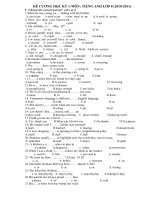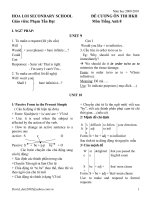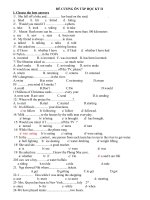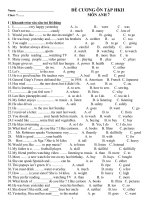De cuong ôn HSG 9 (Tieng Anh)
Bạn đang xem bản rút gọn của tài liệu. Xem và tải ngay bản đầy đủ của tài liệu tại đây (246.86 KB, 19 trang )
«n tËp tiÕng anh 9
A- THEORY
THE PRESENT PERFECT TENSE
1-Form
a. Affirmative:
I, you, we, they + have + PP / He, she, it + has +PP
Note: PP = past participle (quá khứ phân từ) ( =V-ed: V có quy tắc, =V3: V bất quy tắc)
b. Negative:
I, you, we, the + have not (haven’t) + PP / He, she, it + has not ( hasn’t) + PP
c. Interrogative:
Have + I, you, we, they + P.P .... ? / Has + he, she, it + P.P .... ?
2-Use
a. Một hành động bắt đầu trong quá khứ nhưng còn tiếp tục đến hiện tại hoặc tương lai.
Thường đi với : since (từ khi); for (được bao lâu).
Ex1: She has lived here since 1987
Ex2: They have swum for 1 hour
b. Một hành động xảy ra trong quá khứ, không xác định rõ thơi gian.
Thường đi với: already, ever... ( before), never... (before), not, yet, several times, many times...
Ex1: She’s been to Japan several times.
Ex2: I have never worked in that company before.
c. Một hành động vừa mới xảy ra.
Thường đi với : lately, just, recently, in recent weeks/ months / years ....
Ex1: My uncle has just come back form Americ
Ex2: They have done the assignment in recent weeks.
THE SIMPLE PAST TENSE
1-Form
a. Affirmative
S + V-ed/ V2 (V có quy tắc: V+ “ed”;V bất quy tắc; lấy cột thứ 2 trong bảng động từ bất quy
tắc)
b. Negative
S + did not (didn’t) + bare-infinitive
c. Interrogative.
Did + S + bare-infinitive .... ?
Note: The simple past form of ‘to be’
* Affirmative:
You, we, they + were ; / I, he, she, it + was
* Negative
You, we, they + were not (weren’t )/ I, he, she, it + was not (wasn’t)
* Interrogative
Were + you, we, they .... ? / Was + he, she, it..... ?
2-Use
a. Một hành động đã hoàn tất tại một thời điểm nào đó trong quá khứ.
Thường đi với: yesterday, last... ( last week, last year....), ....... ago (3 days ago, .... ), in 1999, in
1987....
Ex1: She was here yesterday.
Ex2: They didn’t learn Chinese 3 year ago.
b. Một thói quen ở quá khứ.
Ex1: They often went fishing when they lived in the country.
Ex2: Jack always got up at 3:00 am last year.
c. Một hành động đã hoàn tất trong một khoảng thời gian xác định trong quá khứ ( from ... to......)
Ex: From 1981 to 1983, my older brother worked as a journalist
PASSIVE VOICE
1- Active into Passive rule:
Active: S + V + O
Passive: S +to be + PP +( by +O)
§éng tõ chÝnh cña c©u chñ ®éng ë th× nµo th× tobe ph¶i chia ë th× ®ã
Note: - Động từ ở câu chủ động ở thì (tense) hay thể (form) nào thì “be” ở câu bị động ở thì hay thể
đó.
- Khi ta không xem người thực hiện hành động (does) là quan trọng, thì “ by object” có thể bỏ
đi.
( eg. S = personal pronoun: he, she, they, we, .... people; no-one.. )
a.The simple present
She cleans the floor everyday.
( S + V / Vs / es... )
Passive: The floor is cleaned everyday.
(S + am/is/are/ +PP...)
b.The present continous.
Mr.Baker is repairing the car
Passive: the car is being repaired by Mr Baker. ( S + am/ is/ are + being + PP...)
c.The present perfect
Someone has stolen the bicycles ( S+ has/have + P.P...)
Passive: The bicycles have been stolen ( S+ has/have + been + PP...)
d.The simple past
Where did they find the drugs ? ( S + V2/ V-ed)
Passive: where were the drugs found ? ( S+ was/ were + PP.....)
e.The past continuous
They were preparing luch when I came there yesterday (S+was/were + V-ing .... )
Passive: Luch was being prepared when I came there yesterday.( S+ was/ were + being + PP.....)
f. The past perfect
She had written almost ten pages by 3:00 pm. ( S+ had + PP...)
Passive: Almost ten pages had been written by 3:00 p.m (S+ had been + PP.....)
g. Will/ would, shall/ should, can/ could, may/might must, have to, be going to, used to, ........
Active: S+ will/would, shall/ should... + bare-infinitive + object
Passive: S + will/would, shall/shoul.... + be + past participle (+ by object).
Ex: Police will destroy these drugs.
Passive: the drugs will be destroyed by police.
2-Special cases
a. Active: s1+ verb1( say/believe/think....) (that) +S2+verb2...
Passive:
Cách 1: It + be + PP (verb1) + s2 + verb2 ....
Cách 2: S2+ be+ PP (verb1) + to- infinitive (verb2)...
Ex: People say that he is crazy.
Passive:
It said that he is crazy
He is said to be crazy.
b. Negatives
Ex1: No-one has cleaned the floor lately.
Passive: The floor hasn’ t been cleaned lately
Ex2: We didn’t do anything about it.
Passive: Nothing was done about it.
c. Who + V + object ...... ?
Passive: - By whom..... ?
- Who...... by ?
Ex: Who wrote this novel ?
Passive:
- By whom was this novel written ?
- Who was this novel written by ?
d. It + be + adjective + to-infinitive + sth
Passive: It + be + adjective + for sth + to be + PP
Ex: It is important to finish this exercise.
It is important for this exercise to be finished
e. Bare-infinitive + object
Passive:
Let + object + be + PP
S + be + allowed / advised/asked/ supposed/ .... + to infinitive
Ex1: Please open the door -> Let the door be opened
Ex2: Turn on the light -> You are supposed to turn on the light.
f. Causative form ( thức mệnh lệnh)
Active: - She + have + sb+ bare-infinitive + st. / - S + get + sb + to- infinitive + sth
Passive: - S + have + sth + PP. / - S + get + sth + PP
Ex1: She has had someone repaint the car./ She has had the car repainted
Ex2: They got me to do the housework./ They got the housework done.
RELATIVE CLAUSE
Mệnh đề quan hệ/ mệnh đề tính từ là mệnh đề phụ trong câu (không thể đứng riêng một mình).
Nó bắt đầu bằng:
a. relative pronouns (đại từ quan hệ) : WHO, WHOM, WHICH, WHOSE, THAT.
b relative adverbs (trạng từ liên hệ) : WHERE, WHEN, WHY.
Ex1: A man who dares to do it dares to do anything.
Ex2: We talked to the man who was from Beijing.
1-WHO
* Thay cho danh từ, đại từ chỉ người, có chức năng của một chủ từ/ tân ngữ.
Ex1: The man has met your boss.He come from Italy.
subject
→ The man who comes from Italy has met your boss
relative clause
Ex2: We have met the girl. She studies in the shool.
→ We have met the girl who studies in the school.
relative clause
2-WHOM
* Thay cho danh từ/ đại từ chỉ người, có chức năng của một tân ngữ.
Ex1: We like the man. You talked to him yesterday.
object
We like the man whom you talked to yesterday
relative clause
Ex2: Is that the man ?. You have been waiting for him.
object
Is that the man whom you have been waiting for ?
relative clause
3-WHOSE
* Thay thế cho sở hữu cách (possessive cases)
* Xuất hiện trong hai cấu trúc.
- .... noun/ pronoun + whose + noun + verb
- ..... noun/ pronoun whose + noun + subject + verb
Ex1: The girl looks disappoited. Her examination result its so bad.
The girl whose examination result is so bad looks disappointed.
Ex2: That is the girl. I took her hat by mistake yesterday.
That is the girl whose hat I took by mistake yesterday.
4-WHICH
* Thay thế cho danh từ, đại từ chỉ vật / sự vật/ sự việc.
* Có thể làm chủ từ hoặc tân ngữ.
Ex1: She show me the table. It was made by her father.
She shows me the table which was made by her father.
Ex2: Do you like this car ? Mr. Tan bought it last month.
Do you like this car, which Mr.Tan bought last month ?
Note: “Which” có thể được sử dụng để thay thế cho một mệnh đề đứng trước nó (= and this/ and
that)
Ex: Tom is so lazy, and this makes Mrs. Green worried.
Tom is so lazy, which makes Mrs. Green worried.
5-WHERE
* Thay cho trạng từ, cụm trạng ngữ chỉ nơi chốn (place) (eg.here, there, in that place.... )
* Thường xuất hiện trong cấu trúc:
...... noun/ pronoun ( = a place) + where + subject + verb ......
Ex: We visit the hospital. We were born there/in that hospital
We visit the hospital where we were born.
6-WHEN
* Thay cho trạng từ, cum từ chỉ thời gian (time) (on that day, in the year...)
* Thường xuất hiện trong cấu trúc :
...... noun / pronoun (= time ) + when + subject + verb ......
Ex: She will never forget the day. She first met him on that day
She will never forget the day when she first met him
CONDITIONAL SENTENCES
1-Điều kiện có thể xảy ra ở hiện tại hoặc tương lai (Điều kiện loại I)
If clause : simple present, Main clause : will/shall/can/may + bare-infinitive
Ex1: If it rain, we won’t go for a picnic
Ex2: Our natural resources will disappear if we do not conserve them
Notes: - Ta có thể sử dụng mệnh lệnh ở mệnh đề chính. Ex: If you drink, don’t drive
- Ta có thể sử dụng “should” ở mệnh đề điều kiện để tỏ ý nghi ngờ.
Ex: If he should call, tell him I will ring back.
- Dạng rút gọn ở mệnh đề điều kiện (if possible, if necessary, if so................)
Ex: If necessary, I will help you.
-Ta có thể sử dụng dạng mệnh lệnh để thay cho mệnh đề chỉ điều kiện.
Trong trường hợp này, giữa hai mệnh đề thường có các liên từ như sau: and, or, else,
otherwise.
2-Điều kiện không xảy ra ở hiện tại (ĐK II) (present unreal condition )
Main clause: would/could/might + bare-infinitive, If clause: simple past
Ex1: If she had wings, she would fly to an island
Ex2: He would build more houses if he were a king.
Note: - ‘If I were you/I were in your position.................’được sử dụng để khuyên nhủ.
Ex: If I were you, I would accept the invitation ( = You should accept the invitation ).
GERUND
The gerund is used as a subject, a complement, an object of a verb or an object of a preposition
(danh động từ được sử dụng như một chủ ngữ, bổ túc từ, túc từ của một động từ, hay túc từ của một
giới từ).....
Ex1: Seeing is believing ( S= gerund)
Ex2: Her hobby is listening to music ( complement = gerund)
Ex3: They have finished doing exercises ( object = gerund)
Ex4: We are font of playing football (Object of an preposition = gerund)
Note: Danh động từ theo sau các động từ như:
to enjoy, to mind, to avoid, to finish, to practise, to suggest, to postpone, to delay, to imagine, can’t
help/stand...
Lưu ý cách sử dụng của các động từ :
• Forget + to-infinitive : quên (sẽ/ phải) làm gì
Forget + ing : quên đã làm việc gì.
Ex1: She forgets being taken to the zoo by her father when she was six
Ex2: Don’t forget to shut the door before leaving.
• Remember + to-infinitive : nhớ ( sẽ/ phải) làm gì;
Remember + V-ing : nhớ đã làm gì
Ex1: They always remember going to cinema together.
Ex2: They remember to have a test on Wendnesday.
• Stop + to-infinitive : dừng ( một việc) lại để làm gì;
Stop + V- ing : dừng làm một việc gì.
Ex1: This moring , I saw Mr.Pike in the street, so I stopped to greet him
Ex2: The teacher asked us to stop talking
• Need + to- infinitive: cần làm gì ( active);
Need + V-ing: cần được ( passive)
Ex1: We need to repair the car.
Ex2: The car needs repairing.
- Lưu ý cấu trúc:
S + spend + time + V-ing .... = It + take + s.b + time + to-inf
CLAUSE OF REASON
+Mệnh đề chỉ lý do là mệnh đề phụ bắt đầu bằng các liên từ chỉ lý do như BECAUSE, AS, SINCE.
Ba chữ này đều có nghĩa vì, bởi vì nhưng cách dùng khác nhau.
Ví dụ: a) Because
- Because he was sleepy, he went to bed. – He went to bed because he was sleepy.









